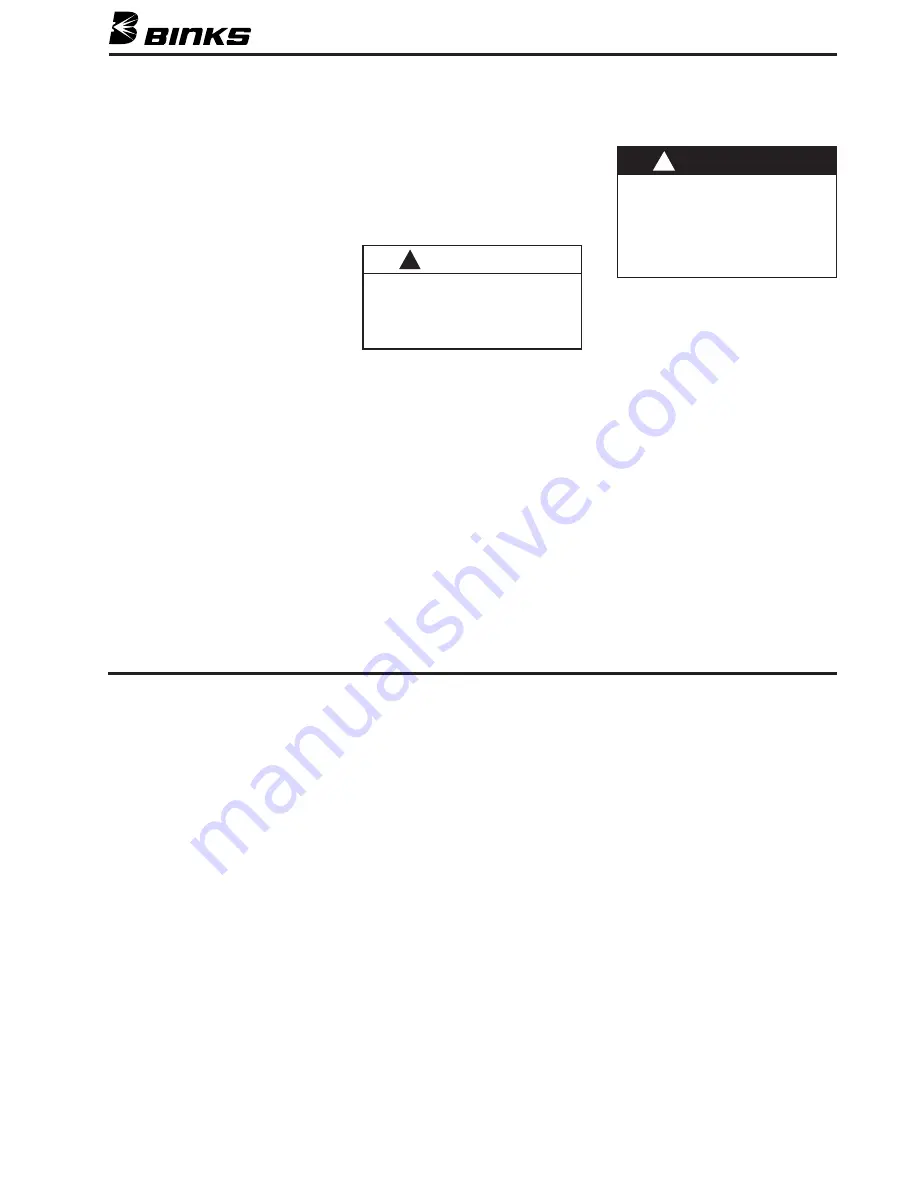
5
SPRAY GUN CLEANING INSTRUCTIONS
MAINTENANCE
In certain states it is now against the law
to spray solvents containing Volatile
Organic Compounds (VOC)’s into the
atmosphere when cleaning a spray gun. In
order to comply with these air quality
laws Binks recommends one of the fol-
lowing two methods to clean your spray
finishing equipment:
1. Spray solvent through the gun into a
closed system
. An enclosed unit or
spray gun cleaning station condenses
solvent vapors back into liquid form
which prevents escape of VOC’s into
the atmosphere.
2. Place spray gun in a washer type
cleaner. This system must totally
enclose the spray gun, cups, nozzles
and other parts during washing, rins-
ing and draining cycles. This type of
unit must be able to flush solvent
through the gun without releasing any
VOC vapors into the atmosphere.
Additionally, open containers for storage
or disposal of solvent or solvent-contain-
ing cloth or paper used for surface prepa-
ration and clean-up may not be used.
Containers shall be nonabsorbent.
AIR AND FLUID NOZZLE
CLEANING
A faulty spray pattern is often caused by
improper cleaning resulting in dried
materials around the material nozzle tip
or in the air nozzle. Soak these parts in
thinners to soften the dried material and
remove with a brush or cloth.
If either the air nozzle or fluid nozzle are
damaged, these parts must be replaced
before perfect spray can be obtained.
CLEANING GUN USED WITH
1 QUART CUP
Relieve pressure in the cup. Then,
unscrew, empty and carefully rinse cup
out with thinners. Place clean thinners in
the cup and spray this through the gun
until it is clean. Blow air through gun to
dry it.
CLEANING GUN USED WITH
PRESSURE CONTAINER
Hold a piece of cloth wadded in the hand
over the gun nozzle and pull the trigger.
The air will back up through the material
nozzle and force the material out of the
hose into the container. Empty container.
Put enough thinners into the container to
wash the hose and gun thoroughly and
spray this through the gun until it is clean.
Then blow out the material hose to dry it
and remove all traces of material by
attaching it to the air line.
CLEANING GUN USED WITH
PAINT CIRCULATING SYSTEM
Shut off material supply and remove
material hose from gun. Clean gun as
used with siphon cup or pressure contain-
er or connect quick release on paint line
solvent line. To ensure clean air to spray
gun, use Binks oil and water extractor.
See your Binks distributor for the correct
model.
TO REPLACE AIR VALVE AND
SPINDLE ASSEMBLY
Remove material valve control knob (21),
spring (18), and needle assembly (20).
Unscrew housing (19), and remove spin-
dle assembly (17) with springs (16 & 18),
housings (15), and o-rings (14). Lubricate
new o-rings with Gunners Mate.
Assemble components using material
needle. Place this assembly along with
housing (19) into gun body and screw
into position. Remove material needle
(20) and tighten housing (19).
TO REPLACE NEEDLE SEAL
AND GLAND ADAPTER IN
FLUID INLET
Remove material valve control knob (21)
and spring (18) and pull out fluid
needle (20). Unscrew packing nut (30)
and remove spring (29) and seal backup
(28). Using a no. 10 x 1-1/4" coarse-
thread wood screw (Binks Part No. 20-
6536) or small sheet metal screw, remove
the needle seal (27) and gland adapter
(26). Replace gland adapter (26) and nee-
dle seal (27). Re-insert seal backup (28)
spring (29) and screw on packing nut (30)
a couple of turns so it fits loosely by
hand. Reassemble fluid needle (20),
spring (18) and material valve control
knob (21). Finally, tighten packing
nut (30) until it bottoms out on fluid
inlet (25).
LUBRICATION
Lubricate daily, all moving parts includ-
ing trigger pivot point and air valve spin-
dle and with Binks Gunners Mate (44).
WARNING
Injection of material from the gun
into the skin may result in serious
personal injury. Shut off the air
supply to the container and release
the pressure on the container before
attempting to clean the gun.
!
CAUTION
Never use metal instruments to
clean the air or material nozzles.
These parts are carefully machined
and any damage to them will cause
faulty spray.
!






























